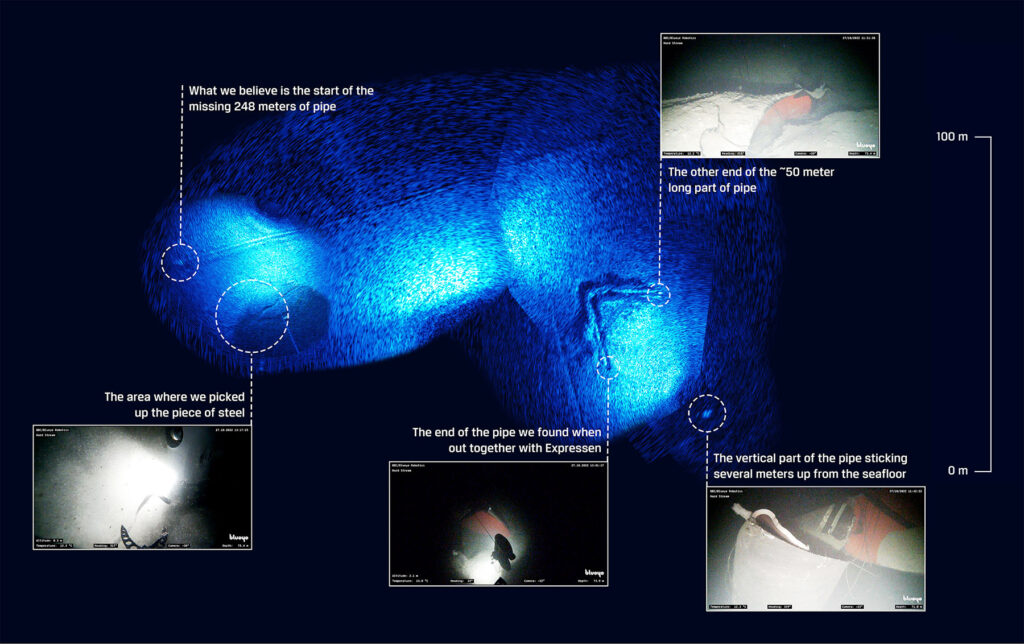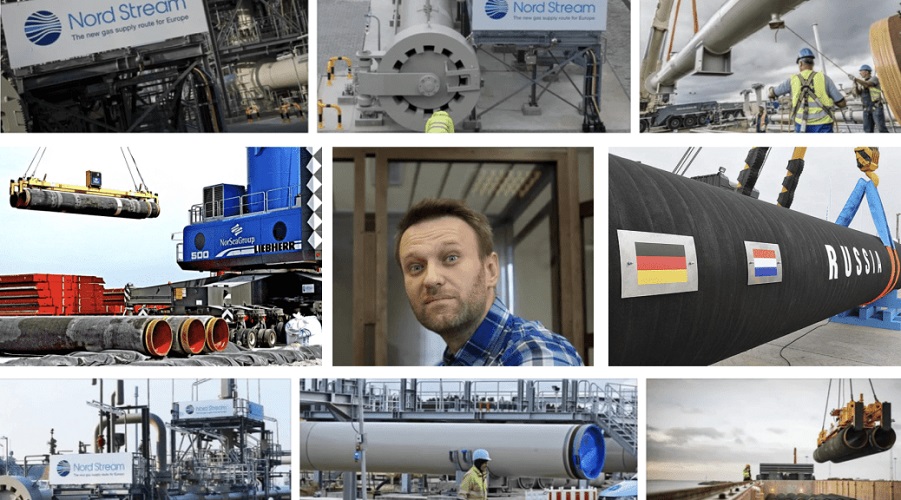I wrote this article for possible publication in Pearls and Irritations on March 6th, so publish it for the record, and for the relevant links. As the film "Navalny" is today awarded at the Oscars, it seems relevant to include him here, used as part of the US weaponry against the German-Russian pipeline. It's interesting to note the collaboration of the German military and sectors of society in the Navalny-Novichok scheme. Also since I wrote the article, the US has delivered its response to Seymour Hersh's expose' with a truly unbelievable and unfeasible story that some "pro-Ukrainian group" of six people in a yacht blew up the pipelines, just for fun. Given the huge amount of publicity given to this story by synchronised Western media, whatever people now hear about Hersh has been neutralised by this appealing but stupid story, while "the US completely denies it played any role". But they make fools of themselves with such balloon-popping stories. The publication of a series of articles by this journal examining Seymour Hersh’s recent shock details on the “Act of War” committed in the Baltic in September has set a formidable precedent, and thrown down the gauntlet to mainstream media to follow if they dare, or if they dare not. Unlike on previous occasions, where Sy Hersh’s brutally straightforward analyses have exposed the crimes of Empire only to a small fraction of its citizens, the extraordinary global significance of the US-led sabotage operation on the Russian-German pipelines is already making it a hot topic around the world. Keeping a lid on the story inside the Western media bubble may prove much more difficult this time round. Ironically, as I have written previously here, my local paper the Border Mail – which is now part of a regional network, Australian Community Media, has deigned to publish my letter on Hersh’s expose, in the context of the imminent 20 year anniversary of the Iraq Invasion, when “we went to war on a lie”. A few of the ordinary burghers of Albury Wodonga will have been exposed to the truth, but so will ACM management. Some of them may recall with discomfort how ACM ran a campaign following the AFP raids on the ABC and Annika Smethurst, under the banner “Your Right to Know”. More to the point, some may wonder whether they had a right to know what some people in our Government and Intelligence services already knew, before we found out about it. And as Alison Broinowski has pointed out, those in power exercise the “right” to decide what exactly we the public are allowed to know, ostensibly “in the interests of National Security” – but actually in the interests of whoever has financial or political control over our Public Servants. We may speculate on whether a ‘D’ notice has been issued over Hersh’s explosive report, and the publication of my letter in a tributary of the mainstream media does not indicate that it hasn’t. But there can be little doubt that the exposure of this act of international terrorism by the “leaders of the civilised world” will be seen as highly dangerous news and that much effort will go into denying, denigrating or dismissing it. It may be dangerous to suggest such a thing – but the recent appearance of ASIO head Mike Burgess with stories of a “hive of (Russian) spies” amongst us looks very like a pre-emptive strike on Mr Hersh and those who would follow him. It is impossible to imagine that our own intelligence services and those they advise would not, at the very least, be aware of what was done to the Nordstream pipelines by our closest allies following the explosion on September 27th. The sharing of such secret information which endangers national security is after all their business. But the question we must then ask is whether we were also party to our Five Eyes partners’ plans, and so potential collaborators? While the simple facts of the sabotage operation, and questions over exactly who was involved are important and sooner or later will be exposed – most likely by the most injured parties in Germany – there are even more important questions to be answered by the beneficiaries. I’d like to present some context to this event, putting the moral issues into proper perspective – that is between the perpetrators and the victims. The perpetrators may be presumed to also be the direct beneficiaries, but there are also collaborators and indirect beneficiaries. The victims are both direct and indirect, and their suffering will vastly outweigh the transient benefits to the perpetrators. This is particularly so given the possibility that the war in Ukraine – facilitated by the West’s covert operations – may descend into a nuclear conflict with unfathomable global consequences. In as far as the US perpetrators have admitted – de facto – to destroying Russia’s main gas pipelines to Germany, they have sought to justify it to their Western allies as a move to prevent Russia exerting control over Germany and Europe by “using gas as a weapon of war”. (Never-mind that Russia is already accused of doing that). Should the US finally be forced to acknowledge that it really did blow up the pipelines, this would likely be presented as a reasonable excuse for their naughtiness – and accepted with a grumble by Europe’s now enslaved population as part of the necessary war on Russia. That population has already adjusted to soaring energy costs and inflation without associating it with the gas pipeline sabotage, and thanks to a mild European winter the worst consequences of increasing gas shortages have been avoided. Were they to understand that their straightened living conditions are a direct result of America’s plan, and will be their new normal for the foreseeable future, they would be less sanguine. That plan – which long preceded the final act of sabotage – was truly ‘made in America’, where profit and competitive advantage are king. German industry, not to mention that of the former Soviet states like Ukraine, was built on cheap and reliable supplies of Russian gas, delivered on long-term contract from Russia’s massive reservoirs. This rankled the US deeply and for a long time, particularly in the close relationship between Germany and Russia. There were numerous attempts by the US to break this bond, particularly following the launching of the Nordstream 2 project. I would include in these the staged poisoning of the Russian irritant Alexei Navalny, which put huge pressure on Angela Merkel to sanction Russia in 2020, and delayed work on the nearly completed NS 2 pipeline. It is instructive to read what I wrote back then, and similar analysis from investigative journalist Finian Cunningham. Navalny’s heroic return from Germany to Russia three days before Joe Biden’s inauguration is another facet of this ongoing disinformation war. It is not widely appreciated that both pipelines were constructed to bypass Ukraine, through which much of Germany’s gas used to pass. This became very problematic in the years before the 2014 coup, thanks to Ukraine’s constant breaking of its agreement on gas transit to Europe. Ukraine refused to pay for the gas it used, and when Russia cut the supply, Kiev diverted gas in transit to Germany, resulting in serious gas shortages and brown-outs. While the US may have liked to take that opportunity to get into the European gas market, it was still developing its domestic market from shale gas fracking, and the high cost of extraction, liquefaction and transport prohibited exports. The huge expansion of the LNG market over the last decade along with development of new gas fields, particularly in Australia, has however changed the picture on the supply side. But the added cost of processing – and incidentally greater emissions – still makes it un-competitive with pipeline gas where that is available. Hence the US marketing solution – first create a shortfall with sanctions and then follow up with a permanent deficit by cutting out the low-priced competitor – and then pull in the profits. While Australia doesn’t directly supply the European market, the massive profit increases of local LNG producers Woodside and Santos last year identify us also as a clear beneficiary of our allies’ pipeline sabotage. I use “us” advisedly, given the price of gas for the Australian consumer has gone through the roof. The gas market was already volatile before that terminal act in September, thanks to sanctions on Russia and Europeans’ fear of breaking them by paying for Russian gas in Roubles. In addition Germany had refused to open the Nordstream 2 pipelines following their completion at the end of 2021, but they were full of pressurised gas when the explosives blew them apart. While Seymour Hersh’s source detailed how two blocks of C4 explosive were attached to each pipeline, he rather understated the scale of what was evidently involved. A composite sonar view of the site shows 25 tonne lengths of pipe distributed over a huge area, indicating that hundreds of kilos of explosive would have been necessary, along with special submersibles capable of installing them 75 metres below sea level. As Hersh’s source did note however, this was “not kid’s stuff”. See below:

A report from the BBC’s Europe correspondent Katya Adler, who accompanied the Norwegian navy and an underwater drone crew to the site a month after the blast, drew similar conclusions on the power of the explosions and extent of the damage. While a Swedish team had already visited the site – and may have removed some material, the drone videos and sonar mapping show clearly what happens when you smash open a pipeline full of highly compressed gas. Norwegian officers Adler interviews are now very aware – and rather paranoid – about the danger to their own network of undersea pipelines, fearing Russian retribution no doubt. That of course is not the way the BBC presents the story, talking of the presence of Russian vessels and drone surveillance as a threat, on the basis that “they’ve done it once and might do it again”. Katya Adler’s interview with Jens Stoltenberg later in the BBC report establishes the idea that such a future act of sabotage would be an “act of war”, seemingly ignoring the obvious fact that this act of war was already committed by them, and against their ally Germany. While the old question of ‘cui bono’, along with ‘cui non bono’ from the pipeline bombing is pretty well answered without access to intelligence sources, there are some outstanding questions which demand answers. Only three of the four pipelines were successfully destroyed, and we can be absolutely certain that the party who installed the explosives would have returned as soon as possible to remove the tell-tale unexploded ones, or asked a partner state to do so. According to MoA and Swedish media reports, the USS Kearsange finally left the Baltic a few days before the detonations, having been parked near Bornholm Island for weeks beforehand. These details will be something for Europeans - and Australians - to ponder on during dark and windless nights next winter, when the renewable energy “opportunity” afforded by the destruction of their Russian gas lifeline looks a little hollow.
DM 13th March 2023
